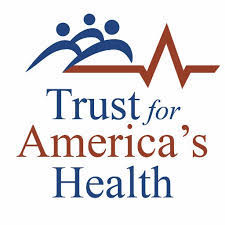Disaster Preparedness
See the following -
New Report Finds Nation's Public Health Emergencies Are Increasing While State Emergency Preparedness Levels face Challenges
 The report takes an annual snapshot of states' public health and emergency readiness. Authored by TFAH since 2003, it...highlights pressing needs for additional action particularly as weather- related and other public health emergencies become more frequent...It identifies specific action-steps that if taken would improve the jurisdiction's overall level of emergency preparedness, including dedicated funding for health security initiatives, modernizing and supporting technologies and innovations within public health programs, and building multisectoral collaboration and leadership.
The report takes an annual snapshot of states' public health and emergency readiness. Authored by TFAH since 2003, it...highlights pressing needs for additional action particularly as weather- related and other public health emergencies become more frequent...It identifies specific action-steps that if taken would improve the jurisdiction's overall level of emergency preparedness, including dedicated funding for health security initiatives, modernizing and supporting technologies and innovations within public health programs, and building multisectoral collaboration and leadership.
- Login to post comments
Open Source at the American Red Cross
When local and national disasters happen, organizations like the American Red Cross are there to provide emergency relief. Quickly and effectively mobilizing over a million volunteers is a technological challenge that regional American Red Cross divisions are turning to open source to solve. Read More »
- Login to post comments
Recent Hurricanes Have the Coast Guard Rethinking Social Media’s Role in Rescue and Response
The U.S. Coast Guard is still knee-deep in rescue and response efforts as the third major hurricane in three weeks hits the U.S. and its territories. But the agency has already learned a thing or two from its initial response efforts and is thinking about new tools it should develop to better prepare for future disasters. When 911 call centers quickly overloaded in Houston, residents in the area quickly took to Facebook and Twitter to ask for help...
- Login to post comments
Recovering from Disasters: Social Networks Matter More than Bottled Water and Batteries
 Standard advice about preparing for disasters focuses on building shelters and stockpiling things like food, water and batteries. But resilience - the ability to recover from shocks, including natural disasters - comes from our connections to others, and not from physical infrastructure or disaster kits. Almost six years ago, Japan faced a paralyzing triple disaster: a massive earthquake, tsunami, and nuclear meltdowns that forced 470,000 people to evacuate from more than 80 towns, villages and cities. My colleagues and I investigated how communities in the hardest-hit areas reacted to these shocks, and found that social networks - the horizontal and vertical ties that connect us to others - are our most important defense against disasters...
Standard advice about preparing for disasters focuses on building shelters and stockpiling things like food, water and batteries. But resilience - the ability to recover from shocks, including natural disasters - comes from our connections to others, and not from physical infrastructure or disaster kits. Almost six years ago, Japan faced a paralyzing triple disaster: a massive earthquake, tsunami, and nuclear meltdowns that forced 470,000 people to evacuate from more than 80 towns, villages and cities. My colleagues and I investigated how communities in the hardest-hit areas reacted to these shocks, and found that social networks - the horizontal and vertical ties that connect us to others - are our most important defense against disasters...
- Login to post comments
Rock Around The Resilience Wheel - Continuity of Operations Through Disruptive Change
 As 2020 comes to a close we are still faced with myriad issues pertaining to public health, elections, economic duress and recovery, unemployment, and living under persistent, pendular change. Resilience has become a popular buzzword to get through these times but is utilized to mean very different things to people looking through very different lenses. Diverse definitions are great but at some point, at some higher and comprehensive perspective, a bow must be put around a common resilience baseline. In layman’s terms, resilience is getting through disruptions and change with some foresight and planning. Resilience matters regardless of the lens you are viewing it through. Covenant Park has coined several catchphrases over our several decades of resilience, risk, continuity, emergency management, security, and national and international planning and execution. Some of those phrases include:
As 2020 comes to a close we are still faced with myriad issues pertaining to public health, elections, economic duress and recovery, unemployment, and living under persistent, pendular change. Resilience has become a popular buzzword to get through these times but is utilized to mean very different things to people looking through very different lenses. Diverse definitions are great but at some point, at some higher and comprehensive perspective, a bow must be put around a common resilience baseline. In layman’s terms, resilience is getting through disruptions and change with some foresight and planning. Resilience matters regardless of the lens you are viewing it through. Covenant Park has coined several catchphrases over our several decades of resilience, risk, continuity, emergency management, security, and national and international planning and execution. Some of those phrases include:
- Login to post comments
Solar powered healthcare facilities in Haiti
The Solar Electric Light Fund (SELF), a Washington, D.C.-based nonprofit working to eliminate energy poverty through the use of solar power, today announced the successful installation of solar electric systems at 11 health care facilities and one hospital along the southwest coast of Haiti. Read More »
- Login to post comments
TFAH: Persistent Underfunding of America's Public Health System Makes the Nation Vulnerable to Disasters and Puts Lives at Risk
 Chronic underfunding of the nation's public health infrastructure has left the nation vulnerable to serious health and safety risks, according to a new report released today by Trust for America's Health...The federal government, primarily through the U.S. Centers for Disease Control and Prevention (CDC), provides critical support for the nation's public health infrastructure including by funding a substantial portion of state and local public health programs. But, between Fiscal Year (FY) 2010 - Fiscal Year 2019, the CDC's budget fell by 10 percent when adjusted for inflation. Cuts to the CDC budget have direct impacts on state and local public health departments' budgets.
Chronic underfunding of the nation's public health infrastructure has left the nation vulnerable to serious health and safety risks, according to a new report released today by Trust for America's Health...The federal government, primarily through the U.S. Centers for Disease Control and Prevention (CDC), provides critical support for the nation's public health infrastructure including by funding a substantial portion of state and local public health programs. But, between Fiscal Year (FY) 2010 - Fiscal Year 2019, the CDC's budget fell by 10 percent when adjusted for inflation. Cuts to the CDC budget have direct impacts on state and local public health departments' budgets.
- Login to post comments
The Secret History of FEMA
FEMA gets no respect. Consider: The two men who are supposed to be helping run the federal government’s disaster response agency had a pretty quiet late August. Even as a once-in-a-thousand-year storm barreled into Houston, these two veterans of disaster response—Daniel A. Craig and Daniel J. Kaniewski—found themselves sitting on their hands. Both had been nominated as deputy administrators in July, but Congress went on its long August recess without taking action on either selection—despite the fact that both are eminently qualified for the jobs.
- Login to post comments
The Shutdown Will Harm the Health and Safety of Americans, even After it's Long Over
 With the U.S. federal government shutdown now the longest in history, it's important to understand what a shutdown means for the health and safety of Americans. The good news is that in the short run, the consequences are relatively few. But, as a researcher who studies natural disaster planning, I believe that Americans should be worried about the federal government's long-term ability to ensure good public health and protect the public from disasters. As the shutdown drags on, it increasingly weakens the government's ability to protect Americans down the road, long after federal workers are allowed to go back to work. Many of these effects are largely invisible and may feel intangible because they don't currently affect specific individuals...
With the U.S. federal government shutdown now the longest in history, it's important to understand what a shutdown means for the health and safety of Americans. The good news is that in the short run, the consequences are relatively few. But, as a researcher who studies natural disaster planning, I believe that Americans should be worried about the federal government's long-term ability to ensure good public health and protect the public from disasters. As the shutdown drags on, it increasingly weakens the government's ability to protect Americans down the road, long after federal workers are allowed to go back to work. Many of these effects are largely invisible and may feel intangible because they don't currently affect specific individuals...
- Login to post comments
The Thin Line Group
 ThinLine was founded to assist federal, state, and local government agencies, commercial and private sector organizations, with continuity planning, disaster prevention, and disaster response. ThinLine provides consulting services and material solutions that address evolving man-made threats such as cyber warfare and terrorist threats. In addition, the Thin Line also addresses the dynamic environmental conditions that follow catastrophic natural disasters such as failing infrastructure. The Thin Line Group supports individuals and organizations that need realistic and sustainable resilience solutions to protect life, property, information, and functions.
ThinLine was founded to assist federal, state, and local government agencies, commercial and private sector organizations, with continuity planning, disaster prevention, and disaster response. ThinLine provides consulting services and material solutions that address evolving man-made threats such as cyber warfare and terrorist threats. In addition, the Thin Line also addresses the dynamic environmental conditions that follow catastrophic natural disasters such as failing infrastructure. The Thin Line Group supports individuals and organizations that need realistic and sustainable resilience solutions to protect life, property, information, and functions.
- Login to post comments
Turning Mobile Devices Into Emergency Tools
 The strongest recorded storm to ever hit land slammed into the Philippines at 195 miles per hour just over a year ago, on 8 November 2013...One of the problems in the aftermath of Typhoon Haiyan was the failure of mobile phone networks. Many base stations were damaged or ran out of power, rendering the tools — which could otherwise have enabled separated families or health workers to communicate — powerless. But there are simple and affordable tweaks that handset manufacturers could introduce to make their products more resilient and useful in disasters, according to Wladimir Alonso, a global health researcher at the US National Institutes of Health...
The strongest recorded storm to ever hit land slammed into the Philippines at 195 miles per hour just over a year ago, on 8 November 2013...One of the problems in the aftermath of Typhoon Haiyan was the failure of mobile phone networks. Many base stations were damaged or ran out of power, rendering the tools — which could otherwise have enabled separated families or health workers to communicate — powerless. But there are simple and affordable tweaks that handset manufacturers could introduce to make their products more resilient and useful in disasters, according to Wladimir Alonso, a global health researcher at the US National Institutes of Health...
- Login to post comments
Why Hospital Data Centers Are Moving to the Cloud
 As hospital data center infrastructures age and resources shrink, IT leaders are increasingly looking to the cloud to meet their storage needs. Not only is it cheaper than investing in upgrades and replacements of existing hardware and software, but it can add a level of security, especially in disaster-prone areas. The trend has some wondering if hospitals will still have physical data centers in the future or whether they will go the way of the dinosaurs.
As hospital data center infrastructures age and resources shrink, IT leaders are increasingly looking to the cloud to meet their storage needs. Not only is it cheaper than investing in upgrades and replacements of existing hardware and software, but it can add a level of security, especially in disaster-prone areas. The trend has some wondering if hospitals will still have physical data centers in the future or whether they will go the way of the dinosaurs.
- Login to post comments
2019 International Conference On Disaster Medicine & Hurricane Resiliency
The devastation wrought by powerful hurricanes over the last two years attests to the need to prepare healthcare professionals for emerging crises associated with natural disasters. The International Conference on Disaster Medicine & Hurricane Resiliency brings together physicians, nurses, educators, and other professionals focused on patient care to explore disaster medicine in the context of hurricanes and other severe weather events. Through workshops, plenaries, and panel discussions, attendees will gain essential emergency planning and preparation skills to better understand the role of disaster medicine in effective healthcare management.
- Login to post comments
44th Annual Natural Hazards Research and Applications Workshop
Since 1975, the Natural Hazards Center has hosted the Annual Natural Hazards Research and Applications Workshop in Colorado. Today the Workshop brings together over 500 federal, state, and local mitigation and emergency management officials; representatives of nonprofit, private sector, and humanitarian organizations; hazards and disaster researchers; and others dedicated to alleviating the impacts of disasters. Our Theme: This year, the Workshop will be organized around the theme of Convergence, which refers to the process of people joining forces to respond to pressing challenges and enduring problems. These connections often require the crossing of boundaries, whether they be disciplinary, organizational, geographic, cultural, political, or otherwise. This work can be challenging, but it is also where fundamental breakthroughs in science and application are most likely to occur.
- Login to post comments
2020 International Conference on Disaster Medicine and Hurricane Resiliency
The 2nd Annual CCDM International Conference on Disaster Medicine and Hurricane Resiliency will gather professionals and experts from around the world to share insights and expertise on preparing for and managing disasters, building disaster management capacity, and educating and training in the health professions. We are once again excited to collaborate on this event with Harvard Medical Faculty Physicians of Beth Israel Deaconess Medical Center and our regional partners in Sint Maarten and the Caribbean.
- Login to post comments
- previous page
- 1
- 2
- 3